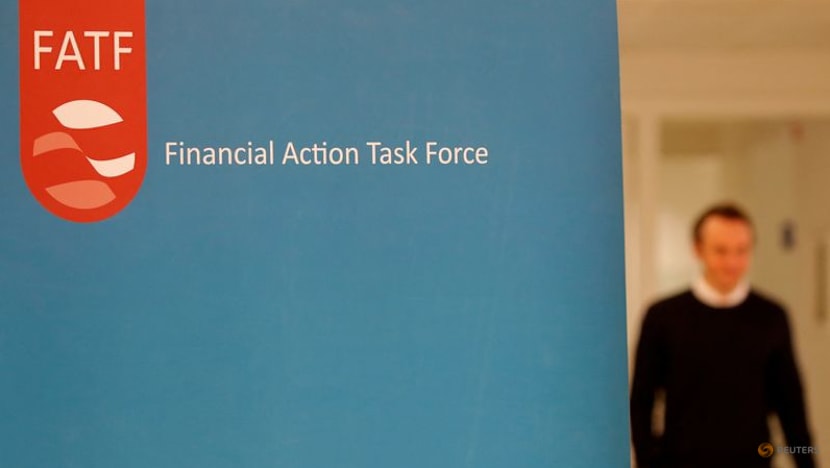Financial crime watchdog calls for countries to come clean on shell companies

The logo of the FATF (the Financial Action Task Force) is seen during a news conference after a plenary session at the OECD Headquarters in Paris, France, on Oct 18, 2019. (Photo: REUTERS/Charles Platiau)
PARIS: The head of the global financial crime watchdog has called on countries to come clean on the use of shell companies, calling them the "getaway car" for criminals, and said the problem would be a key part of a new round of national assessments.
The Financial Action Task Force's focus on shell companies comes after both the United States under President Donald Trump and Switzerland have this year rowed back on transparency rules for beneficial owners.
Paris-based FATF, an intergovernmental anti-money laundering group, assesses countries in a six-year cycle on implementation of recommendations designed to reduce financial crime. Those include a requirement to keep a register of accurate and up-to-date information about the people behind companies and entities, also known as "beneficial ownership".
In the next round of assessments, "we will be looking heavily into the effectiveness of those systems," FATF President Elisa de Anda Madrazo told Reuters in an interview, describing shell companies as the "getaway car" which enables criminals to move money around the world without detection.
"Countries need to make sure that the information is updated, complete, accurate, and readily available for law enforcement authorities," she said.
"We do see countries that are implementing the standard and moving into that direction," she added.
The FATF can put countries with weak measures for combating crime on its "grey list", which brings increased monitoring and can damage their appeal among investors. Countries currently on the list include Monaco and the British Virgin Islands. North Korea, Iran and Myanmar are on a black list.
Earlier this year, Washington dropped some measures aimed at combating illicit finance. The US Treasury Department's financial crimes unit in March stopped requiring domestic companies to provide the government with data on their beneficial ownership, although foreign firms are still required to do so.
In June, Switzerland's parliament excluded foundations and associations from a planned national transparency register of beneficial owners, a step which the government had previously warned would jeopardise Switzerland's commitment to combating money laundering and terrorist financing.
A 2023 Moody's study of 472 million registered companies around the world found that nearly 20 million had at least one characteristic which could indicate a shell company. The UK had by far the most red flags raised.
Asked whether increasing polarisation between countries was making it harder to combat crime, de Anda Madrazo said, "any kind of fragmentation on international collaboration and communication impairs an agenda."
"At the FATF level, I can tell you that in this year, we haven't seen a decrease in the commitment of the members," de Anda Madrazo said. She said that also applied to the wider global network.
Online crime is a top challenge for FATF, authorities to play "whack-a-mole" as it constantly evolves, de Anda Madrazo said.
Virtual assets such as cryptocurrencies remain high on FATF's agenda, as criminals increasingly use them to move money across borders undetected, she said.













